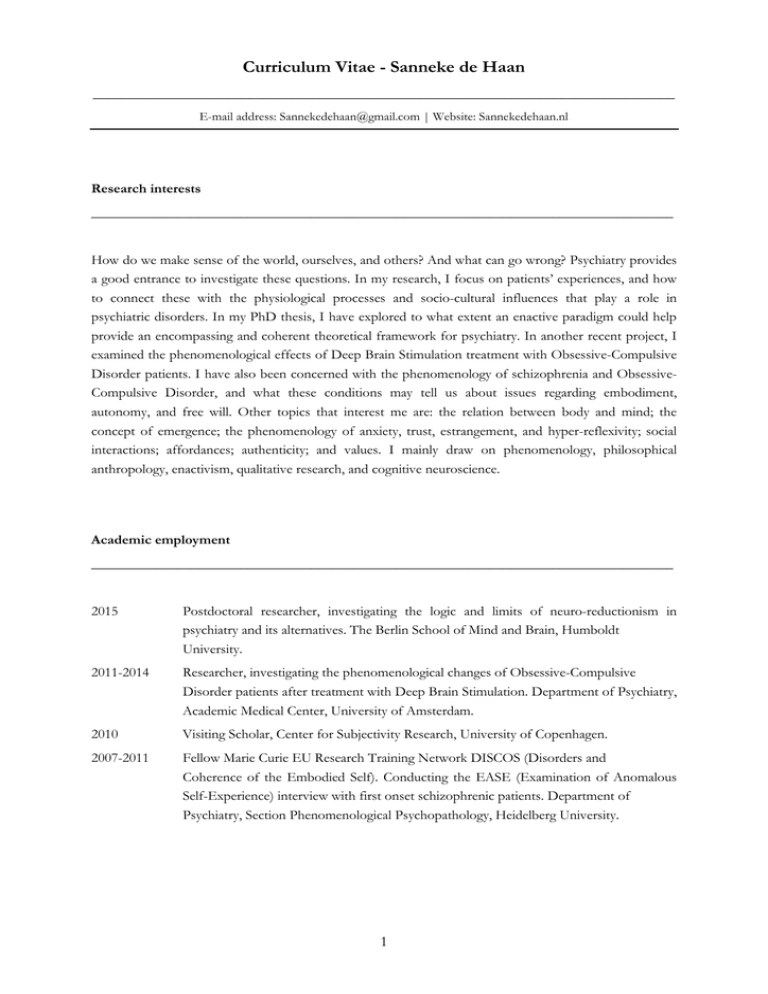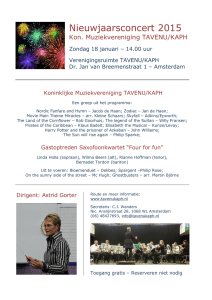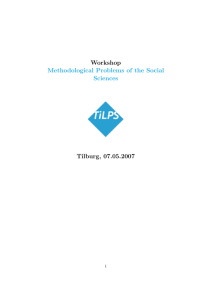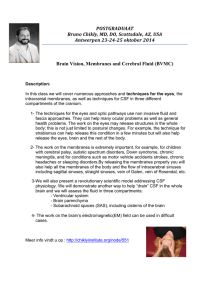CV Sanneke de Haan
advertisement

Curriculum Vitae - Sanneke de Haan __________________________________________________________________________________ E-mail address: Sannekedehaan@gmail.com | Website: Sannekedehaan.nl Research interests __________________________________________________________________________________ How do we make sense of the world, ourselves, and others? And what can go wrong? Psychiatry provides a good entrance to investigate these questions. In my research, I focus on patients’ experiences, and how to connect these with the physiological processes and socio-cultural influences that play a role in psychiatric disorders. In my PhD thesis, I have explored to what extent an enactive paradigm could help provide an encompassing and coherent theoretical framework for psychiatry. In another recent project, I examined the phenomenological effects of Deep Brain Stimulation treatment with Obsessive-Compulsive Disorder patients. I have also been concerned with the phenomenology of schizophrenia and ObsessiveCompulsive Disorder, and what these conditions may tell us about issues regarding embodiment, autonomy, and free will. Other topics that interest me are: the relation between body and mind; the concept of emergence; the phenomenology of anxiety, trust, estrangement, and hyper-reflexivity; social interactions; affordances; authenticity; and values. I mainly draw on phenomenology, philosophical anthropology, enactivism, qualitative research, and cognitive neuroscience. Academic employment __________________________________________________________________________________ 2015 Postdoctoral researcher, investigating the logic and limits of neuro-reductionism in psychiatry and its alternatives. The Berlin School of Mind and Brain, Humboldt University. 2011-2014 Researcher, investigating the phenomenological changes of Obsessive-Compulsive Disorder patients after treatment with Deep Brain Stimulation. Department of Psychiatry, Academic Medical Center, University of Amsterdam. 2010 Visiting Scholar, Center for Subjectivity Research, University of Copenhagen. 2007-2011 Fellow Marie Curie EU Research Training Network DISCOS (Disorders and Coherence of the Embodied Self). Conducting the EASE (Examination of Anomalous Self-Experience) interview with first onset schizophrenic patients. Department of Psychiatry, Section Phenomenological Psychopathology, Heidelberg University. 1 Education __________________________________________________________________________________ 16.06.2015 Ph.D. Philosophy (Magna Cum Laude), An Enactive Approach to Psychiatry (supervisors: Thomas Fuchs & Gerrit Glas), Heidelberg University 2004-2006 Research MA Philosophy (Cum Laude), University of Amsterdam 2002-2004 BA Philosophy (Cum Laude), University of Amsterdam 1998-2004 BA Humanistic Studies (Cum Laude), University of Humanistic Studies, Utrecht Courses & Training __________________________________________________________________________________ 2012 Psychology Specialisation courses in Brain & Cognition, University of Amsterdam 2011 Qualitative Healthcare Course, Academic Medical Center, University of Amsterdam 2008 EASE (Examination of Anomalous Self-Experience) Course, University of Copenhagen 2006-2007 Traineeship Humanistic Existential Counsellor, Groene Hart Hospital, Gouda Publications – Journal papers __________________________________________________________________________________ In preparation S.E. de Haan, E. Rietveld, M. Stokhof, D. Denys, Deep Brain Stimulation and personality changes: Experiences of Obsessive-Compulsive Disorder patients. In preparation S.E. de Haan, An enactive approach to psychiatry. Under review J. Luigjes, V. Lorenzetti, S.E. de Haan, G.J. Youssef, L.F. Fontenelle, C. Murawski, Z. Sjoerds, W. Van den Brink, D. Denys, M. Yücel, Defining compulsive behaviour and disentangling it from impulsive behaviour and habit. 2015 S.E. de Haan, E. Rietveld, M. Stokhof, D. Denys, Effects of Deep Brain Stimulation on the lived experience of Obsessive-Compulsive Disorder patients: In-depth interviews with 18 patients. PLOS ONE 10-8, pp. 1-29. 2014 D. Núñez, R. Oelkers-Ax, S.E. de Haan, M. Ludwig, H. Sattel, F. Resch, M. Weisbrod, T. Fuchs, Do deficits in the Magnocellular priming underlie visual derealization phenomena? Preliminary neuro-physiological and self-reports in first episode schizophrenia patients. Schizophrenia Research 159, 2-3, pp. 441-9. 2014 S.E. de Haan, E. Rietveld, D. Denys, Stimulating good practice: What an Embodied Embedded Cognition approach could actually mean for Deep Brain Stimulation practice. American Journal of Bio-ethics Neuroscience 5-4, pp. 46-48. 2 2013 S.E. de Haan, E. Rietveld, M. Stokhof, D. Denys, The phenomenology of Deep Brain Stimulation-induced changes in Obsessive-Compulsive Disorder patients: An enactive affordance-based model. Frontiers in Human Neuroscience 7, pp. 1-14. 2013 S. E. de Haan, De existentiële dimensie van de psychiatrie: een enactivistische benadering. Psyche & Geloof 24-2, pp. 130-140. 2013 E. Rietveld, S.E. de Haan, D. Denys, Social affordances in context: What is it that we are bodily responsive to? Behavioral and Brain Sciences 36, p.436. 2012 G.B. Van der Kraats, S.E. de Haan, G. Meynen, Zelfbeleving in de vroege fase van psychose: een fenomenologisch benadering. Tijdschrift voor Psychiatrie 54-12, pp. 1021-1029. 2012 L.C. de Bruin, S.E. de Haan, Enactivism and social cognition: In search for the whole story. Journal of Cognitive Semiotics IV (1), pp. 225-250. 2010 S.E. de Haan, T. Fuchs, The ghost in the machine: Disembodiment in schizophrenia. Psychopathology 43, pp. 327-333. 2010 F. Laroi, S.E. de Haan, S. Jones, A. Raballo, Auditory verbal hallucinations: dialoguing between the cognitive sciences and phenomenology. Phenomenology and the Cognitive Sciences 9, pp. 225-240. 2009 S.E. de Haan, L.C. de Bruin, Reconstructing the minimal self, or how to make sense of agency and ownership. Phenomenology and the Cognitive Sciences 9, pp. 373-396. Publications – Book chapters __________________________________________________________________________________ 2015 S.E. de Haan, E. Rietveld, D. Denys, Being free by losing control: What ObsessiveCompulsive Disorder can tell us about free will. In: W. Glannon (ed.), Free will and the brain: Neuroscientific, philosophical, and legal perspectives. Cambridge: Cambridge University Press. 2013 S.E. de Haan, Te veel denken is gevaarlijk. In: M. Schermer, M. Boenink, G. Meynen (eds.), Komt een filosoof bij de dokter. Amsterdam: Boom, pp. 35-49. 2013 S.E. de Haan, E. Rietveld, D. Denys, On the nature of obsessions and compulsions. In: D. Baldwin & B. Leonard (eds.), Modern Trends in Pharmacopsychiatry – Anxiety Disorders. Basel: Karger, pp. 1-15. 2011 S.E. de Haan, Fenomenologie van de lichaamservaring. In: D. Denys & G. Meynen (eds.), Handboek voor Psychiatrie en Filosofie. Utrecht: De Tijdstroom, pp. 213-229. 2011 S.E. de Haan, H. De Jaegher, T. Fuchs, A. Mayer, Expanding perspectives. The interactive development of perspective-taking in early childhood. In: W. Tschacher & C. Bergomi (eds.), The implications of embodiment: cognition and communication. Exeter: Imprint Academic, pp. 129-151. 3 2010 S.E. de Haan, The minimal self is a social self. Comment on Zahavi’s ‘Minimal self and narrative self: A distinction in need of refinement’. In: T. Fuchs & H. Sattel, & P. Henningsen (eds.), The embodied self. Dimensions, coherence, and disorders. Stuttgart: Schattauer Verlag, pp.12-18. Teaching experience __________________________________________________________________________________ 2009-2014 Incidental (guest) lectures at bachelor’s and master’s level in philosophy of mind (Heidelberg University) and psychopathology (University of Amsterdam). 2003-2006 Teaching Assistant of the programme ‘Meaning: Identity and Existence’, University of Humanistic Studies, Utrecht. This included curriculum development, weekly workgroups, examinations, and grading. Bachelor level, enrolment: circa 20 students. 2002-2003 Teaching Assistant of the programme ‘Body and Meaning’, University of Humanistic Studies, Utrecht. This included weekly workgroups, examinations, and grading. Bachelor level, enrolment: circa 20 students. 2001 Teaching Assistant of programme ‘Introduction to Humanistic Studies’, University of Humanistic Studies, Utrecht. Weekly workgroups, bachelor level, enrolment circa 20 students. Presentations ________________________________________________________________________________ 13.08.2015 Causality in psychiatric disorders: How to avoid neuro-reductionism. Invited talk; Summer school ‘Neurophilosophy: Self, Science, and Society, Radboud University Nijmegen. 10.08.2015 Deep Brain Stimulation and personality changes: experiences of ObsessiveCompulsive Disorder patients. Invited talk; Summer school ‘Neurophilosophy: Self, Science, and Society, Radboud University Nijmegen. 26.05.2015 Mind-body dualistic tendencies in psychiatry: their rationale and how to overcome them. Invited talk; Workshop ‘The philosophy and the science of mind’, Ghent University. 23.04.2015 Does explanation require the uncovering of underlying mechanisms? Invited talk; Workshop ‘Modeling minds’, Radboud University Nijmegen. 20.04.2015 The importance of being spontaneous. Invited talk; Workshop ‘The importance of being planful’, Utrecht University. 11.02.2015 What is a psychiatric disorder? Invited public lecture; Duck-Rabbit Lectures, Amsterdam. 26.11.2014 Combining philosophical and empirical research methods. Invited talk; PhD lecture series, Philosophy Students Association Amfibi, University of Amsterdam. 4 16.07.2014 Phenomenological effects of Deep Brain Stimulation with Obsessive-Compulsive Disorder patients: a non-reductionist perspective. Invited talk; Colloquium Cognitive Science Institute, University Osnabrück. 25.06.2014 Becoming a different person? Phenomenological effects of Deep Brain Stimulation with Obsessive-Compulsive Disorder patients. Invited talk; Colloquium Health Ethics and Society, Maastricht University. 22.05.2014 Hyper-reflexiviteit, lichaamsbeleving, en neuro-reductionisme. Invited talk; Symposium ‘Lijf en Lichaam’, Stichting Psychiatrie en Filosofie, Amsterdam. 21.02.2014 Autonomy for relational agents. Invited talk; Workshop ‘Self-management as management of the self’, NIAS Wassenaar. 06.02.2014 There’s meaning everywhere. Beyond erklären vs. verstehen in psychiatry. Invited talk; Workshop ‘The contemporary relevance of the erklären/verstehen distinction in psychiatry and biology, Utrecht University. 13.12.2013 Phenomenological effects of Deep Brain Stimulation with Obsessive-Compulsive Disorder patients: An enactive affordance-based approach. Invited talk; Workshop ‘Situating and emoting the embodied mind’, Free University Berlin. 05.11.2013 Wie is er eigenlijk (niet) gek? Invited public lecture; Filosofisch Café Nijmegen. 23.10.2013 An enactive approach to psychiatry: Obsessive-Compulsive Disorder and Deep Brain Stimulation as a test case. Invited talk; Seminar ‘Philosophy, psychology, and Informatics’, University of Edinburgh. 25.09.2013 An enactive approach to psychiatry: lessons from Obsessive-Compulsive Disorder and Deep Brain Stimulation. Invited talk; Workshop ‘Embodied embedded cognition and psychiatry’, Radboud University Nijmegen. 22.05.2013 Phenomenological effects of Deep Brain Stimulation. Invited public lecture & debate; ‘Hacking the brain’, University of Amsterdam. 04.04.2013 An enactive approach to psychiatry. Presentation; Workshop ‘Re-conceptualizing mental illness’, AISB Conference, University of Exeter. 06.05.2012 An enactive approach to psychiatry. Presentation; Conference Association for the Advancement of Philosophy & Psychiatry ‘The bio-psycho-social and other models for psychiatry’, Philadelphia University. 07.01.2012 Daring to be indifferent: The impact of Deep Brain Stimulation on the Phenomenology of Obsessive-Compulsive Disorder patients. Invited talk; Colloquium SMART Cognitive Science with Daniel Dennett, University of Amsterdam. 19.05.2011 An enactive approach to psychiatry. Presentation; Workshop Embodied embedded cognition & Neurophenomenology, University of Antwerp. 19.05.2011 The Phenomenology of Deep Brain Stimulation: An interdisciplinary study on the effects of DBS on the mood of psychiatric patients (with Damiaan Denys and Erik Rietveld). 5 Presentation; Workshop Embodied embedded cognition & Neurophenomenology, University of Antwerp. 19.06.2010 Case studies from the Heidelberg EASE Study. Presentation; Conference ‘Intersubjectivity and the Self’, University of Budapest. 23.03.2010 The phenomenology of intersubjectivity: from conflict to play. Presentation; Colloquium Center for Subjectivity Research, University of Copenhagen. 25.02.2010 Phenomenological background of EASE (with Thomas Fuchs). Presentation; Workshop ‘Examination of Anomalous Self-Experience (EASE)’, Heidelberg University. 28.01.2010 Exploring embodied resonance and its role in social interaction (with Leon de Bruin). Invited talk; Winter symposium ‘Meaning and Interaction: Dynamic models and social interaction’, Århus University. 21.01.2010 The intersubjective development of perspectives and boundaries (with Hanne De Jaegher). Invited talk; Workshop Plastic human boundaries, Heidelberg University. 22.10.2009 Towards a dialectical psychopathology: the case of schizophrenia. Presentation; Conference Philosophy & Psychiatry ‘Understanding mental disorders’, Lisbon University. 22.10.2009 Schizophrenic ‘as-if’ experiences at the level of sense and attribution (with Leon de Bruin). Presentation; Conference Philosophy & Psychiatry ‘Understanding mental disorders’, Lisbon University. 09.10.2009 Expanding perspectives: From the monadic Theory of Mind to the interactive experience of persons (with Hanne De Jaegher). Presentation; Fall Academy ‘Embodied Cognition & Embodied Communication’, Bern University. 27.09.2009 A dialectical account of autonomy. Presentation; Summer school ‘The Social Self’, Alghero University. 17.06.2009 The body and its selves. Comment on Corrado Sinigaglia and Vittorio Gallese; Summer school ‘Self, Agency & Neuroscience’, University of Parma. 04.04.2009 Distinguishing normal from pathological self-disturbance in adolescence. Presentation; Conference World Psychiatry Association ‘Treatments in Psychiatry: A new update’, University of Florence. 12.03.2009 Reconstructing the minimal self - or how to make sense of agency and ownership (with Leon de Bruin). Presentation; Workshop ‘The relation between minimal and extended self’, Center for Subjectivity Research, University of Copenhagen. 24.01.2009 Hallucinations: Philosophical interpretations and existential effects. Presentation; Conference 17th European Congress of Psychiatry, Lisbon University. 21.01.2009 How to make sense of agency and ownership (with Leon de Bruin). Presentation; Workshop ‘Embodied embedded cognition & Neurophenomenology’, Groningen University. 6 12.11.2008 Introduction into phenomenology through foot massage. Presentation; Workshop ‘Practical Phenomenology’, Heidelberg University. 01.09.2008 Being yourself without being in control. Poster; Workshop ‘Enactive approaches to Social Cognition’, Battle. 02.07.2008 Being yourself without being in control: implications of schizophrenia for concepts of autonomy. Presentation; Graduate Conference ‘Phenomenology and Philosophy of Mind’, Durham University. 30.06.2008 Being yourself without being in control. Poster; Conference ‘Consciousness, Agency and the Will’, University of Edinburgh. 12.04.2008 Sense of agency, spontaneity, and schizophrenia. Presentation; Workshop ‘Neurophilosophy’, Mainz University. Organization __________________________________________________________________________________ 22.05.2014 Symposium ‘Lijf en Lichaam’, Amsterdam. With Stichting Psychiatrie en Filosofie. 24-28.10.2011 International Fall School ‘Theoretical and empirical implications of embodied and embedded approaches to the self in psychiatry, philosophy, and psychosomatic medicine’, Heidelberg University. With Stefan van Geelen. 2008-2010 Research Seminar of the Section ‘Phenomenological psychopathology and psychiatry’, biweekly, Heidelberg University. 2008-2010 Reading Group ‘Phenomenology and Psychiatry’, bi-weekly, Heidelberg University. 25-26.02.2010 International Workshop ‘Examination of Anomalous Self-Experience (EASE)’, Heidelberg University. 19.05.2009 International Workshop ‘How to write a Grant Proposal’, Heidelberg University. 12.11.2008 International Workshop ‘Practical Phenomenology’, Heidelberg University. With Hanne De Jaegher and Joel Krüger. Grants __________________________________________________________________________________ 3-4.04.2013 AISB Bursary (Artificial Intelligence Society Britain) £ 100, University of Exeter. 24-28.10.2011 DFG Grant (Deutsche Forschungsgemeinschaft) € 20.620 (with Stefan van Geelen) for the organisation of a Fall School on Theoretical and empirical implications of embodied and embedded approaches to the self in psychiatry, philosophy, and psychosomatic medicine, Heidelberg University. 7 Academic service __________________________________________________________________________________ 2016 Member of the board of Stichting Psychiatrie en Filosofie (Psychiatry and Philosophy Foundation) 2015 Guest-editor of a special issue of Philosophy, Psychiatry & Psychology on ‘An enactive approach to psychiatry’, together with Hanne De Jaegher and Thomas Fuchs. 2013 Co-supervision of one BA Thesis (with Damiaan Denys), and one internship (with Erik Rietveld) 2013-2014 Member of AISB Program Committee ‘Re-conceptualizing mental ‘illness’’, University of Exeter, Goldsmiths University of London 2009-present Reviewer for Phenomenology and the Cognitive Sciences, Philosophical Psychology, Topoi 2004-2006 Chairman of the Education Committee of the Philosophy Research Master, University of Amsterdam. Languages __________________________________________________________________________________ Dutch (native), English (fluent), German (fluent), French (intermediate level) 8


